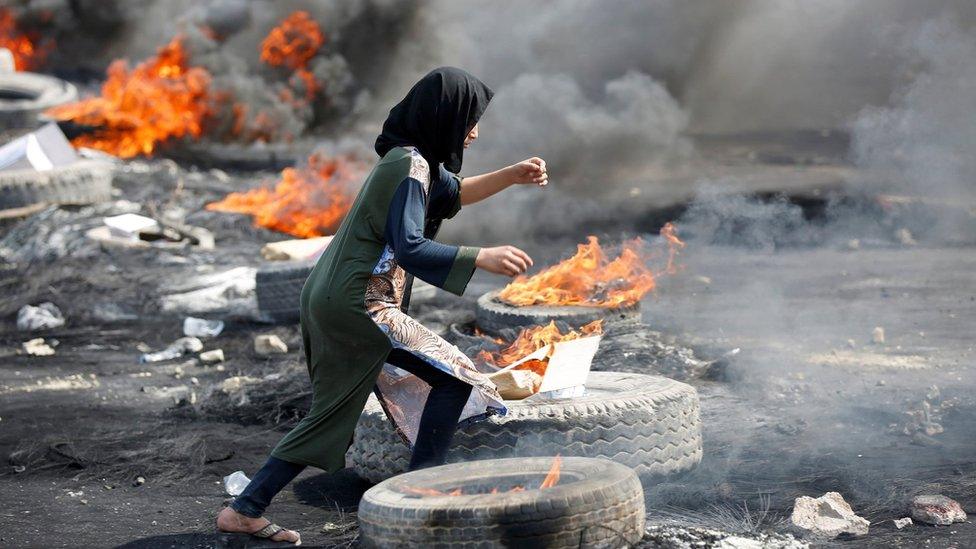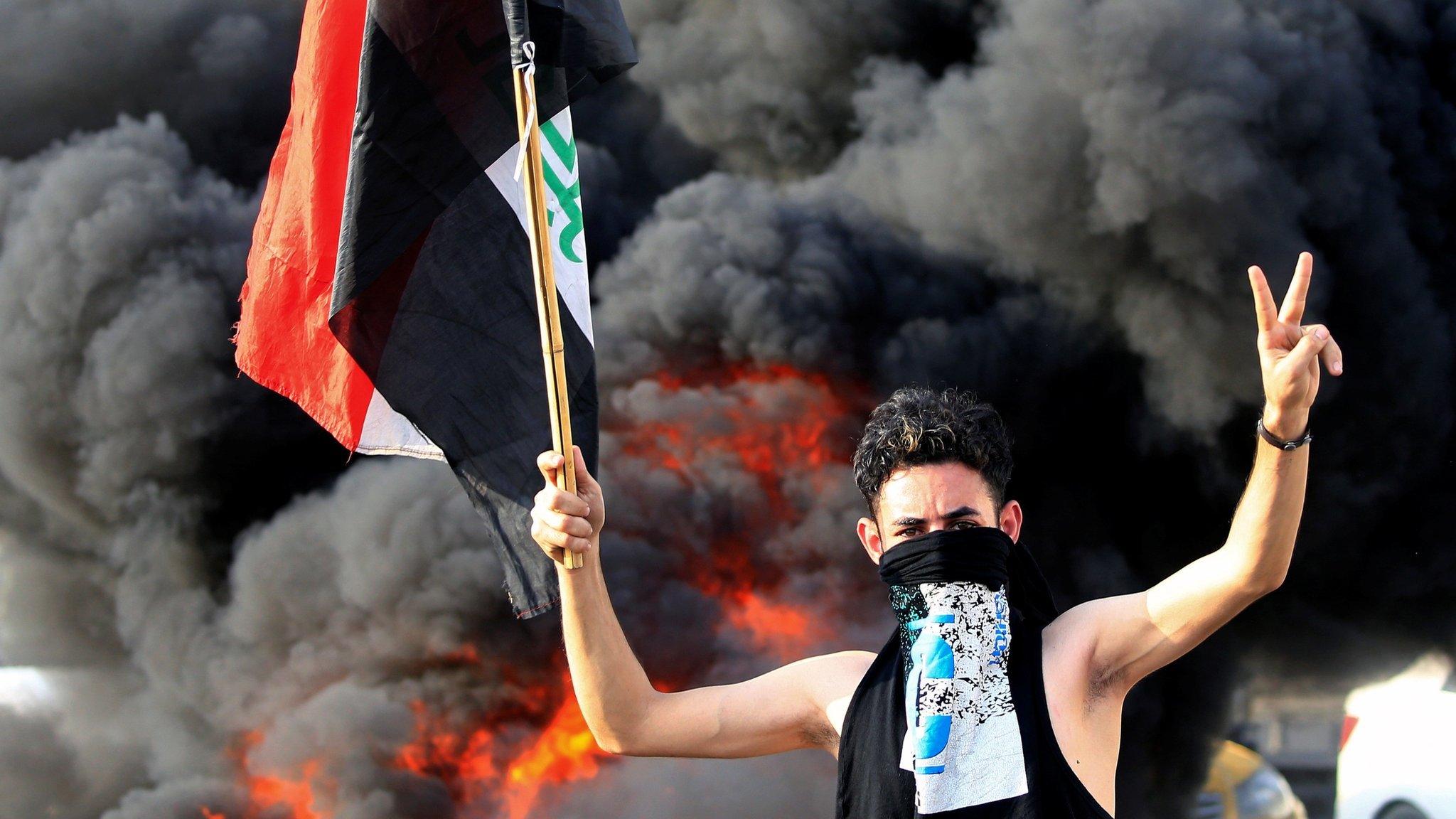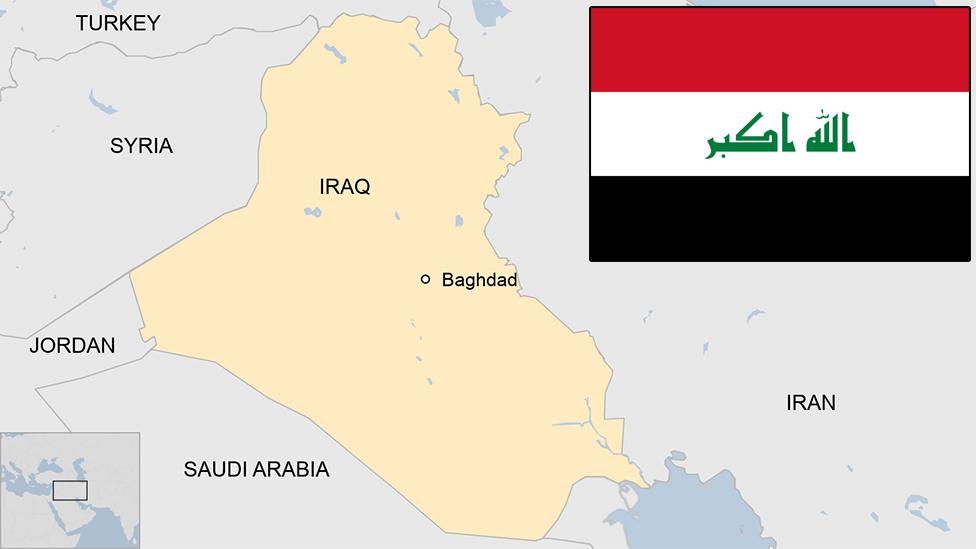Iraq protests: Shots fired as demonstrators defy Baghdad curfew
- Published
Iraqi anti-government protesters defy an open-ended curfew
Security forces in the Iraqi capital, Baghdad, have fired live rounds at protesters defying a curfew.
The prime minister says the open-ended curfew - which has been in place since dawn - is needed to maintain order and protect protesters from "infiltrators".
At least 20 people have been killed since Tuesday in clashes with security forces in Baghdad and other cities.
Thousands have taken to the streets to vent their anger at high unemployment, poor services and corruption.
The protests, which appear to lack any organised leadership, are the largest since Adel Abdul Mahdi became prime minister a year ago.
The United Nations and the United States have expressed concern at the violence and urged the Iraqi authorities to exercise restraint.
On Thursday, human rights group Amnesty International has called on the government in Baghdad to immediately rein in its security forces, external.
What is the latest?
After two days of protests in Baghdad, the government imposed an indefinite curfew that started at 05:00 (02:00 GMT) and applied to everyone except those travelling to and from the capital's airport. Ambulances and religious pilgrims were also excluded.
Security forces blocked major roads and bridges. Access to the internet was also limited, making it harder to organise protests on social media.

Protesters took to the streets of Baghdad on Thursday despite the open-ended curfew
But thousands of protesters gathered in and around Tahrir Square - the focus of the recent unrest - prompting riot police to fire tear gas and shots in the air to disperse them.
"Despite the curfew we are going out to protest, to demand our rights. We want to change the regime," one protester told Reuters news agency.
"They have arrested our people. They have done things to our people they did not even do to Daesh [the jihadist group Islamic State]. They have beaten them up and humiliated them while firing live gunfire," he added. "What did we do? Are we suicide bombers?"

More from Iraq:

Violence is concentrated in Baghdad and in the majority Shia Muslim areas of the south. Northern Kurdish regions and Sunni-majority areas in the west remain mostly calm.
On Thursday, police and hospital sources told Reuters that protesters had been killed in the capital, and also in and around the southern cities of Amara, Diwaniya, Hilla and Nassiriya, among others. Hundreds have been wounded.

Overnight on Wednesday, explosions were heard in Baghdad's heavily fortified Green Zone, where government offices and foreign embassies are located.
The US-led coalition fighting the Islamic State group in Iraq said none of its facilities were hit and that Iraqi security forces were investigating the blasts.
What has the government said?
On Tuesday evening, Prime Minister Abdul Mahdi expressed regret for the violence.
"It saddens me and breaks our hearts the injuries among the protesters, our sons, and the security forces and the destruction and looting of public and private properties," he wrote on Facebook.
He added: "We stress to the people of our nation that our priorities were and will remain focused on providing radical realistic solutions to many of the decades-long accumulated problems."
What triggered the unrest?
The protests appear to be the result of a spontaneous upwelling of frustration at Iraq's high youth unemployment rate, its dire public services and chronic corruption.
Simona Foltyn, a journalist based in Baghdad, told the BBC's World Update programme: "The demonstrators I have spoken to so far have said that these protests are a grassroots movement, comprised of a variety of people - men, women, graduates, the unemployed, the elderly - who are all airing grievances that have accumulated over the past years."
Protesters and security forces face off in Najaf
"They have all denied the involvement of any political party. They are, in fact, extremely disenfranchised and disappointed with the political establishment here."
She added: "All of the people who are protesting seem to be united in one thing: they want a better life. They want services, they want jobs, and they want living standards to go up."
After meeting a number of protesters on Wednesday, UN special representative Jeanine Hennis-Plasschaert said: "These are legitimate and longstanding demands. A direct dialogue, to discuss ways forward and to bring about immediate and tangible results, is of great importance."
Last year, the southern Iraqi city of Basra was rocked by weeks of protests over unsafe drinking water, power shortages, unemployment and corruption. Government offices, including the main provincial council building, were set alight.
What is the economic situation like in Iraq?
Iraq has the fourth-largest reserves of oil, but 22.5% of its population of 40 million were living on less than $1.90 (£1.53) a day in 2014, according to the World Bank. One in six households has experienced some form of food insecurity.
The unemployment rate was 7.9% last year, but among young people it was double that. And almost 17% of the economically active population is underemployed.

The country is also struggling to recover after a brutal war against the Islamic State group, which seized control of large swathes of the north and west in 2014.
The Iraqi government and World Bank estimated last year that $88bn (£71bn) was needed to fund short- and medium-term reconstruction.
Just over one million people are still internally displaced, while 6.7 million are in need of humanitarian assistance, the UN says. Living conditions are dire in many conflict-affected areas, with insufficient basic services.
- Published3 October 2019

- Published13 September 2023
